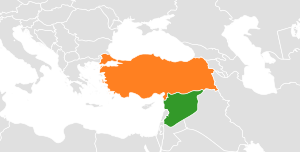Abu Huzaifa al-Kanadi
Abu Huzaifa al-Kanadi, also known as Abu Huzaifa the Canadian, is a self-described member of the Islamic State terrorist group, which he joined in 2014 after emptying his bank account and visiting Syria. His real name is unknown to the public and he agreed to speak to Canada's CBC News on condition that it would not be revealed.[1] Huzaifa has been counselled by Canadian Security Intelligence Service agent Mubin Shaikh. He returned to Canada in 2016; rumours that he lives in the Toronto area have circulated. In 2018, he said in a podcast on The New York Times website that he murdered two people while fighting for ISIS and has been criticized by conservatives, some of whom have called for him to be found and arrested.
Abu Huzaifa al-Kanadi | |
|---|---|
| Nationality | Pakistani Canadian |
| Education | Madrassa in Pakistan (claimed), Canadian university in Toronto (currently) |
Abu Huzaifa al-Kanadi | |
|---|---|
| Other name(s) | Abu Huzaifa the Canadian |
| Born | Toronto |
| Allegiance | |
| Years of service | 2014–2016 |
| Rank | Former recruit |
| Battles/wars | Manbij |
Background
Abu Huzaifa al-Kanadi was raised in or near Toronto, Canada, and went to Pakistan as a teenager to study.[2] He claimed he studied at a Pakistani madrassa in 2013.[1] He told his parents he would go to Turkey for a semester abroad and booked a flight from Lahore to Istanbul using his Pakistani passport.[1] Upon arrival, he was met by a former resident of Mississauga—a city in the Greater Toronto Area—and visited the Syria–Turkey border town of Jarabulus to cross into Syria at night.[1] Prior to leaving Toronto in 2014, he cleaned out his bank account.[1] He returned to Canada in 2016 and is currently attending a university in the Toronto area.[1]
Islamic State member
In 2014, Huzaifa left Canada to join the Islamic State group; he entered Manbij, a city located north-east of Aleppo that had a population of about 100,000 people.[1] He stated that he trained for a few weeks and was assigned to al-Hisba, an Islamic police force enforcing Sharia law.[1] He used several hundred dollars to purchase a rifle, a Glock pistol, an ISIS military uniform, and other tactical gear decorated with ISIS badges.[1] He said he made friends with other foreign fighters from Australia and Finland.[1] He met Mohammad Ali of Mississauga, also known as Abu Turaab al-Kanadi, who was the only Canadian he met.[1] He also stated that he knew about André Poulin, a Muslim convert from Timmins, Ontario, who was known as Abu Muslim al-Kanadi.[1]
In a podcast on The New York Times website, Huzaifa said he had murdered people while fighting for the Islamic State.[3] He escaped to Turkey, where he was arrested by authorities before being released a week later.[1] After his release, he returned to Pakistan and stayed for two years before returning to Canada.[1]
Return to Canada
_(cropped).jpg)
Huzaifa returned to Canada in 2016 after two years of fighting for the Islamic State.[4] Upon his return, he had discussions with journalist Rukmini Callimachi; she stated that he initially felt confident that he had escaped law enforcement.[4] Former schoolmates stated that Huzaifa was a "loner" and an "anti-social guy" without "many friends".[4] Huzaifa's background story was compared to those of Quebec Mosque shooter Alexandre Bissonnette and Toronto van attack suspect Alek Minassian.[4] A year after Huzaifa returned, he was interviewed by CBC News and stated that he saw violence on a scale he could "never imagine" when he fought for the Islamic State.[1] Mubin Shaikh stated that Huzaifi could be "rehabilitated" and that Canada needs to "have an eye" on him.[5]
Controversies
After Huzaifa said he fought for the Islamic State, Conservative MPs called for action against him.[6] Conservative politician Candice Bergen criticized Canada's Prime Minister Justin Trudeau and the Liberal government during Question Period for not ordering law enforcement to arrest him.[7] Bergen also called for Public Safety Minister Ralph Goodale to reveal whether the government knew where Huzaifa was, but Goodale stated that doing so would be the "opposite of keeping Canadians safe".[8] Trudeau called questions about Huzaifa "divisive" and received criticism from conservative journalist Brian Lilley.[9] Huzaifa also received concerns from television journalist Diana Swain that he may be "lying" to The New York Times or CBC News.[10]
References
- Baksh, Nazim; Lancester, John (11 September 2017). "Young Canadian ISIS recruit says he saw violence on scale he could never have imagined". CBS News.
- Malcolm, Candice (15 June 2018). "Malcolm: Canadian jihadists are bolder than ever, meanwhile Trudeau weakens our laws". Toronto Sun.
- Buller, Alice (5 June 2018). "New York Times podcast 'Caliphate' faces backlash over ethics". Arab News.
- Balkissoon, Denise (25 May 2018). "Canada's mysterious Islamic State returnee looks frighteningly familiar". The Globe and Mail.
- MacDonald, Brennan; Kapelos, Vassy (24 May 2018). "Canada needs to 'have eyes' on returned ISIS fighter, says de-radicalization expert". CBC News.
- "Conservative MPs call for action on self-described terror recruit for Daesh reportedly in Toronto". Toronto Star. The Canadian Press. 11 May 2018.
- Fernando, Spencer (12 May 2018). "Watch: Bergen Rips Trudeau Government For Letting Confessed-ISIS Terrorist Come Back To Canada". Spencer Fernando.
- Khandaker, Tamara (11 May 2018). "Politicians are freaking out over a podcast about returned Canadian ISIS fighter". Vice News.
- Lilley, Brian (12 May 2018). "Trudeau worries that questions about a violent ISIS fighter are divisive". Brian Lilley.
- Swain, Diana (19 May 2018). "Did former Canadian ISIS member lie to the New York Times or to CBC News?". CBC News.
